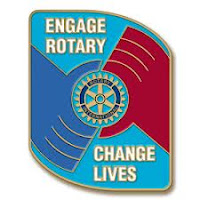I wrote the first version of
this paper in 1998 whilst trying to assess how Cumbria County Council might
better involve communities in decision making.
At the time the key issues
were seen as the need to;
Ø
develop the Communities of Cumbria
Ø
invite Citizens to inform decision making and support
the development of their neighbourhoods
Ø
develop fellowships of members, staff and citizens
Ø
use the principles of continuous improvement (Kaizen)
All of these being underpinned by the need to show
that the authority was providing "Best Value" to all.
The parallels with where
Rotary finds itself now are uncanny. We
need to;
- enable our Clubs to (re)engage with their communities
- support Rotarians as they identify community needs and the needs
of their own Clubs
- bring RI (RIBI), Districts and Clubs closer together
- encourage each other to Engage Rotary to Change Lives
The original version of this
paper took a look at some of the ideas behind Community Building, Fellowship
and Kaizen.
One question that was asked was, "Are Fellowship and Community one in the same? ". We could add to this by asking if a Rotary Club is a Community in its own right, or just a fellowship of like minded people.?
The following definition of
Community helps us understand why they probably are the same ….
"A Group of two or more people who,
regardless of the diversity of their personal backgrounds or ideology, age,
race, gender, sexuality or politics, have been able to accept, transcend and
celebrate their differences. This
enables them to communicate openly and to work and play together in a generous
and rewarding way"[1]
Does this definition resonate with you? After all
Rotary unites people from all continents, cultures, and occupations—it's truly
one of our greatest strengths. Our members are leaders in their fields and
communities. Our diverse perspectives help us to see problems differently—and
help us solve them in communities throughout the world.
So why is it important to be
talking about Fellowship & Community in this way?
If we are to get closer to
the communities we purport to serve and, as a result, show that we are able to
change the way engage with them. Perhaps
we are going to have to remove some of the "baggage" that we are
often accused of having. "We've
always done it this way", "When am I going to have the time to
change", "We've heard all of this before but nothing
changes". We are going to have to
challenge ourselves and our colleagues to enable the (Re)Engagement of Rotary
with the communities in which we live work and play.
There are many Rotarians that state that they don't their Rotary to be like business, however we have to be business like and this is where the link to
Kaizen comes in. The Kaizen philosophy assumes
that our way of life, our culture, deserves to be constantly improved.
“Continuous improvement in personal life, home life,
social life and working life as a whole.
As related to the workplace, Kaizen means continuing improvement
involving managers and workers, customers and suppliers alike. Quality is anything that can be
improved. “[2]
If we agree that we have to
change the way we do things or do different things (Re-Engineer to Re-Engage)
then Kaizen based ideas can provide some of the tools to help. But Kaizen is a philosophy; it has a culture
of its own. Is this the culture that Rotary needs?
In order to Re-Engineer in a
way that ensures we keep people with us and motivate them along the way then we
should use Kaizen techniques. Kaizen can be seen as having
a culture of partnership very similar to the ideas of Fellowship and Community
highlighted earlier.
It is clear that we have to
enable everyone to cope with the need to “Engage Change to allow Rotary to Live” Our internal and external communities who are
being invited to give their constructive view of our services and how we
provide them, perhaps having to think about what they want from Rotary for the
first time. The Rotarian who has been
aching to have their say for so long and is now being invited to contribute to
developments. Or even the "We've
always done it this way" group who need to be inspired to see over the
horizon.
We have a wide range of
people who need to be able to grasp this culture of continual change and
improvement quickly.
Kaizen philosophy encourages
people to…
Ø
Discard
conventional fixed ideas
Ø
Think of how to
do it, not why it can’t be done
Ø
Not to make
excuses. Start by questioning current
practices
Ø
Not to seek
perfection. Do it right even if for **[3]%
of the target
Ø
Correct it right
away, if you make a mistake
Ø
Not to spend
money on Kaizen, use your wisdom
Ø
Realise that
Wisdom is brought out when faced with hardship
Ø
Ask “WHY ?” five
times and seek root causes
Ø
Seek the wisdom
of ten people rather than the knowledge of one
Ø
Accept that
Kaizen ideas are infinite
The inclusive nature of this
philosophy is typically promoted through the use of such tools as Quality
Circles, Focus Groups etc. In order for
these developmental groups to work successfully they need to be a
"Community" in their own right.
Rotary already has many appropriate tools available and is developing more. Many Clubs are already taking a look at what they are doing and we should encourage many more to do so.

